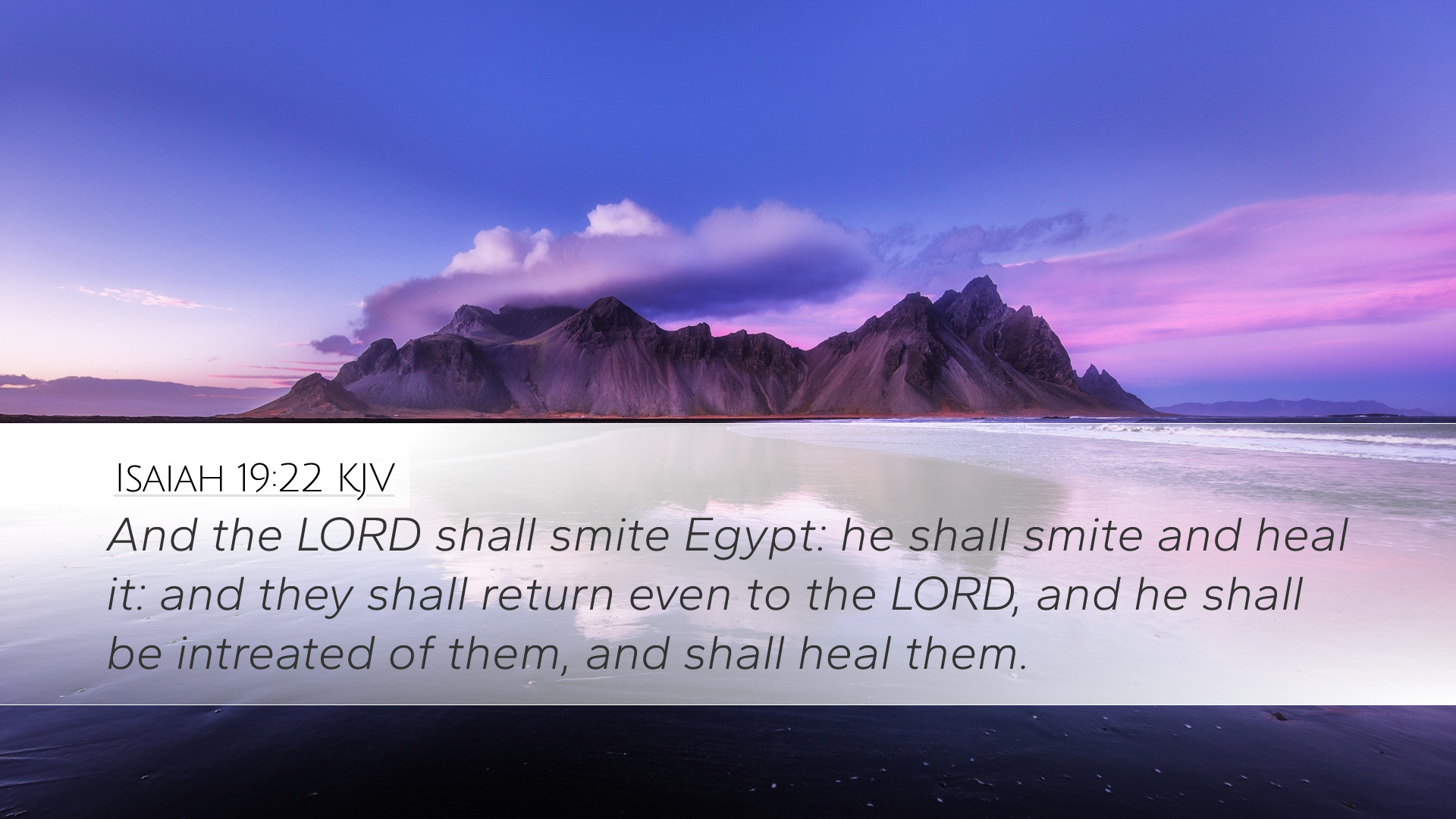Isaiah 19:22 - Commentary and Insights
Verse Reference: Isaiah 19:22 - "And the LORD shall smite Egypt: He shall smite and heal it: and they shall return even to the LORD, and he shall be intreated of them, and shall heal them."
Introduction
This verse is a profound declaration from the prophet Isaiah, offering a glimpse into God's redemptive plan for a nation historically in opposition to Him. The dual action of smiting and healing illustrates God's sovereignty and mercy, providing rich material for theological reflection.
Contextual Background
The prophetic context of Isaiah speaks to the nation of Israel but extends significantly to surrounding nations, including Egypt. The relationship between Israel and Egypt is complex, characterized by periods of conflict as well as cultural and economic interactions. Here, Isaiah speaks to Egypt's judgment and restoration, highlighting God's impartiality in His dealings with nations.
Commentary Insights
Matthew Henry’s Commentary
Matthew Henry emphasizes that God's actions are both a demonstration of justice and mercy. He notes, "Though God will punish Egypt for their sins, He will also bring them to repentance." Henry elaborates on the metaphorical smiting and healing, stating that this reflects God's willingness to correct His wayward people while offering restoration upon their return.
Albert Barnes’ Exposition
Albert Barnes points out the prophetic nature of the smiting as a precursor to repentance. He states, "God’s judgments are designed to lead nations to Himself." Barnes further explains that the phrase "and he shall heal them" indicates that this restoration will follow true repentance, affirming that the healing of the land is contingent on spiritual renewal. He highlights that the return to the LORD signifies a turning point, underlining the necessity of divine intervention in achieving lasting change.
Adam Clarke’s Commentary
Adam Clarke delves into the symbolism present in this verse, suggesting that the smiting represents various forms of calamity that could befall Egypt, including military defeat, natural disasters, or social upheaval. Clarke interprets the healing as a divine restoration, indicating that God will not abandon nations in their distress but will provide a pathway to recovery. He also notes the importance of intercession, reflecting the theme that sincere prayers of the repentant are met with divine favor.
Theological Implications
- Divine Judgment and Mercy: The verse illustrates the balance between God’s justice and mercy. It reassures believers that even in judgment, restoration is possible.
- Call to Repentance: The process of smiting serves not only as punishment but also as an invitation to turn back to God, emphasizing the role of personal and communal repentance.
- International Scope of God’s Sovereignty: God's engagement with Egypt conveys His lordship over all nations, suggesting that God's plans encompass all people regardless of their status in relation to Israel.
Practical Applications
For pastors, students, and theologians, the themes present in Isaiah 19:22 can be translated into practical applications:
- Encouragement to Leaders: Church leaders can take heart from God’s commitment to restoration, encouraging congregations to trust in God's capacity to heal nations and communities.
- Emphasis on Prayer: The necessity of appealing to God for healing aligns with the biblical injunction to pray for one’s nation, underscoring the role of the church in advocating for societal well-being.
- Understanding God’s Nature: This passage aids in developing a robust theological understanding of God as both a judge and healer, which is vital for faithful teaching and preaching.
Conclusion
Isaiah 19:22 is a powerful reminder of the dynamic relationship between divine judgment and mercy. It calls for deep reflection on the part of humanity regarding repentance and restoration, providing a strong foundation for understanding God’s redemptive purposes not only for Israel but for all nations. By engaging with this text and its commentaries, one can draw valuable lessons for modern-day ministry and personal faith.


